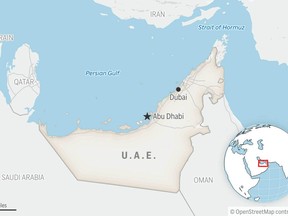
Article content
ABU DHABI, United Arab Emirates (AP) — Abu Dhabi hosted a major oil summit Monday, hours after the OPEC+ cartel and its allies said it would halt further production increases planned in the first quarter of 2026 over concerns of too much supply in the market.
THIS CONTENT IS RESERVED FOR SUBSCRIBERS ONLY
Subscribe now to read the latest news in your city and across Canada.
- Exclusive articles from Barbara Shecter, Joe O'Connor, Gabriel Friedman, and others.
- Daily content from Financial Times, the world's leading global business publication.
- Unlimited online access to read articles from Financial Post, National Post and 15 news sites across Canada with one account.
- National Post ePaper, an electronic replica of the print edition to view on any device, share and comment on.
- Daily puzzles, including the New York Times Crossword.
SUBSCRIBE TO UNLOCK MORE ARTICLES
Subscribe now to read the latest news in your city and across Canada.
- Exclusive articles from Barbara Shecter, Joe O'Connor, Gabriel Friedman and others.
- Daily content from Financial Times, the world's leading global business publication.
- Unlimited online access to read articles from Financial Post, National Post and 15 news sites across Canada with one account.
- National Post ePaper, an electronic replica of the print edition to view on any device, share and comment on.
- Daily puzzles, including the New York Times Crossword.
REGISTER / SIGN IN TO UNLOCK MORE ARTICLES
Create an account or sign in to continue with your reading experience.
- Access articles from across Canada with one account.
- Share your thoughts and join the conversation in the comments.
- Enjoy additional articles per month.
- Get email updates from your favourite authors.
THIS ARTICLE IS FREE TO READ REGISTER TO UNLOCK.
Create an account or sign in to continue with your reading experience.
- Access articles from across Canada with one account
- Share your thoughts and join the conversation in the comments
- Enjoy additional articles per month
- Get email updates from your favourite authors
Sign In or Create an Account
or
Article content
The OPEC+ decision comes as both the United States and the United Kingdom implemented new oil sanctions targeting Russia over its war on Ukraine. Those sanctions targets included Rosneft and the Russian oil company Lukoil, whose red-and-white logo hung over the annual Abu Dhabi International Petroleum Exhibition and Conference in the Emirati capital as a major sponsor of the event.
Article content
Article content
Article content
The UAE has maintained close ties to Russia despite the war, but has served as a key interlocutor between Kyiv and Moscow to negotiate prisoner exchanges.
Article content
By signing up you consent to receive the above newsletter from Postmedia Network Inc.
Article content
On Sunday, OPEC+ met and decided to increase its production by an additional 137,000 barrels of oil beginning in December. However, it said other adjustments planned in January, February and March of next year would be paused “due to seasonality.”
Article content
OPEC+ includes the core members of the cartel, as well as nations outside of the group led by Russia.
Article content
Benchmark Brent crude sold Monday around $65 a barrel, down from a post-COVID high of some $115 a barrel after Russia’s full-scale invasion of Ukraine in 2022. It had fallen to $60 a barrel in recent days over concerns that the market had too much production.
Article content
“Yes, OPEC+ is blinking, but it’s a calculated move,” said Jorge Leon, the head of geopolitical analysis at Rystad Energy. “Sanctions on Russian producers have injected a new layer of uncertainty into supply forecasts, and the group knows that overproducing now could backfire later. By pausing, OPEC+ is protecting prices, projecting unity, and buying time to see how sanctions play out on Russian barrels.”
Article content
Article content
Meanwhile, U.S. President Donald Trump’s administration continues to push for more production in America. Interior Secretary Doug Burgum, a former Republican governor of North Dakota, was on hand for the Abu Dhabi oil summit on Monday. Burgum chairs Trump’s National Energy Dominance Council. The average price for a gallon of gasoline in the U.S., a key economic and political indicator in the country, stood at $3.03 on Monday.
Article content
The oil conference, known by the acronym ADIPEC, comes after the UAE hosted the United Nations COP28 climate talks in 2023. Those talks ended with a call by nearly 200 countries to move away from planet-warming fossil fuels — the first time the conference made that crucial pledge.
Article content
But the UAE as a whole still plans to increase its production capacity of oil to 5 million barrels a day in the coming years as it pursues more clean energy at home.
Article content

.jpg) 7 hours ago
3
7 hours ago
3
 English (US)
English (US)